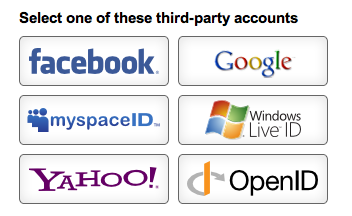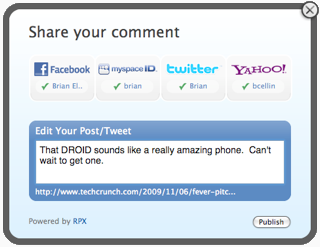Ruby: RPXNow.com user login/creation and view helpers Facebook, Twitter, Google, MSN, OpenID, MySpace, Yahoo -- All in One
Janrain Engage (formerly known as RPXNow):
- Login to your page through Facebook / Twitter / Myspace / Google / OpenId / MS-LiveId / AOL / …
- Simpler then OpenId/OAuth/xxx for developers AND users
- Publish user activity to facebook/twitter/myspace/…/-stream via the same API
- Returning users are greeted by their choosen provider
- Free for up to 2500 accounts/year (above 5k it gets expensive…)



Usage
- Get an API key @ Janrain Engage
- run MIGRATION
- Build login view
- Receive user-data from Janrain to create or login User
- for more advanced features have a look at the Janrain Engage API Docs
Install
gem install rpx_now
Examples
Example application, go play around!
environment.rb
RPXNow.api_key = "YOU RPX API KEY"
Controller
This example uses the SessionsController, if you dont have one built it and add routes(rpx_token is a post request)
skip_before_filter :verify_authenticity_token, :only => [:rpx_token] # RPX does not pass Rails form tokens...
# user_data
# found: {:name=>'John Doe', :username => 'john', :email=>'[email protected]', :identifier=>'blug.google.com/openid/dsdfsdfs3f3'}
# not found: nil (can happen with e.g. invalid tokens)
def rpx_token
raise "hackers?" unless data = RPXNow.user_data(params[:token])
self.current_user = User.find_by_identifier(data[:identifier]) || User.create!(data)
redirect_to '/'
end
# getting additional profile fields (these fields are rarely filled)
# all possibilities: https://rpxnow.com/docs#profile_data
data = RPXNow.user_data(params[:token], :additional => [:gender, :birthday, :photo, :providerName, ...])
# normal + raw data
RPXNow.user_data(params[:token], :additional => [:raw_response])[:raw_response]['profile]['verifiedEmail']
# only raw data
email = RPXNow.user_data(params[:token], :raw_response => true)['profile']['verifiedEmail']
# with extended info like friends, accessCredentials, portable contacts. (most Providers do not supply them)
RPXNow.user_data(params[:token], :extended => true)[:extended]['friends'][...have a look at the RPX API DOCS...]
View
<%=RPXNow.embed_code('My-Rpx-Domain', url_for(:controller => :session, :action => :rpx_token, :only_path => false))%>
OR
<%=RPXNow.popup_code('Login here...', 'My-Rpx-Domain', url_for(:controller => :session, :action => :rpx_token, :only_path => false), options)%>
Options
:language => 'en' janrain tries to detect the users language, but you may overwrite it possible languages
:default_provider => 'google' possible default providers
:flags => 'show_provider_list' possible flags
:html => {:id => 'xxx'} is added to the popup link (popup_code only)
:fallback_url => :enable forces fallback link to /openid/embed url (default)
:fallback_url => :disable disables fallback url (will mean Javascript is required for users to sign in)
:fallback_url => :legacy forces fallback to legacy widget url
For more on the status of fallback URLs see Janrain Support Forum discussion
Unobtrusive / JS-last
popup_code can also be called with :unobtrusive => true ( --> just link without javascript include).
To still get the normal popup add RPXNow.popup_source('My-Rpx-Domain', url_for(:controller => :session, :action => :rpx_token, :only_path => false), [options])
Options like :language / :flags should be given for both.
Advanced
Versions
RPXNow.api_version = 2
Custom domain (Plus/Pro)
RPXNow.domain = 'other-domain.com'
Mappings (Plus/Pro)
You can map your primary keys (e.g. user.id) to identifiers, so that
users can login to the same account with multiple identifiers.
RPXNow.map(identifier, primary_key) #add a mapping
RPXNow.unmap(identifier, primary_key) #remove a mapping
RPXNow.mappings(primary_key) # [identifier1,identifier2,...]
RPXNow.all_mappings # [["1",['google.com/dsdas','yahoo.com/asdas']], ["2",[...]], ... ]
After a primary key is mapped to an identifier, when a user logs in with this identifier,
RPXNow.user_data will contain his primaryKey as :id.
A identifyer can only belong to one user (in doubt the last one it was mapped to)
User integration (e.g. ActiveRecord)
class User < ActiveRecord::Base
include RPXNow::UserIntegration
end
user.rpx.identifiers == RPXNow.mappings(user.id)
user.rpx.map(identifier) == RPXNow.map(identifier, user.id)
user.rpx.unmap(identifier) == RPXNow.unmap(identifier, user.id)
Contacts (Pro)
Retrieve all contacts for a given user:
RPXNow.contacts(identifier).each {|c| puts "#{c[‘displayName’]}: #{c[‘emails’]}}
Status updates (Pro)
Send a status update to provider (a tweet/facebook-status/…) :
RPXNow.set_status(identifier, “I just registered at yourdomain.com …”)
Activity (Pro)
Post a users activity, on their e.g. Facebook profile, complete with images, titels, rating, additional media, customized links and so on …
RPXNow.activity( identifier,
:url => href, :action => 'Im loving my new', :user_generated_content => 'Im loving my new ... ',
:title => product.title, :description => product.description,
:action_links => [{:text => 'view >>', :href => product_url(product, :only_path => false)}],
:media => [{:type => :image, :src => product.image_url, :href => product_url(product, :only_path => false)}]
)
Offline user data access (Plus/Pro)
Same response as auth_info but can be called with a identifier at any time.
Offline Profile Access must be enabled.
RPXNow.get_user_data(identifier, :extended => true)
Auth info
Same response as user_data with :raw_response, but without any kind of failure detection or post processing.
RPXNow.auth_info(params[:token])
Author
Contributors
- Amunds
- Bob Groeneveld
- DBA
- dbalatero
- Paul Gallagher
- jackdempsey
- Patrick Reagan (reagent)
- Joris Trooster (trooster)
- Mick Staugaard (staugaard)
- Kasper Weibel
- Nicolas Alpi
- Ladislav Martincik
- Ben Aldred
- Casper Fabricius
- Avi Flombaum
- Paul Gallagher
Michael Grosser
[email protected]
Hereby placed under public domain, do what you want, just do not hold me accountable…